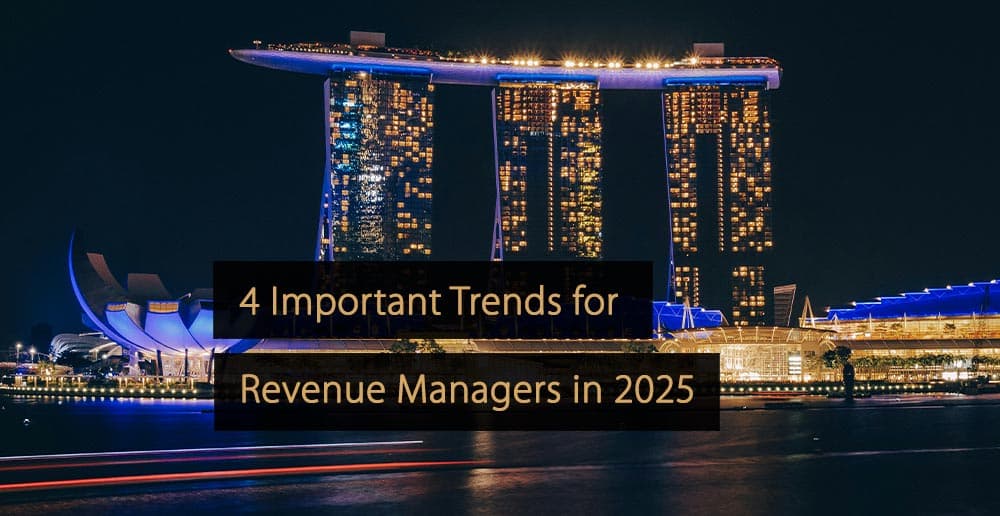Question for Our Revenue Management Expert Panel:
Some roles are shrinking due to Artificial Intelligence. How have revenue management roles and systems been affected to date? (Question by Oleksii Kapichin)
Industry Expert Panel
Our Industry Expert Panel exists out of professionals within the hospitality & travel Industry. They have comprehensive and detailed knowledge, experience in practice or management and are forward-thinking. They are answering questions about the state of the industry. They share their insights on topics like revenue management, marketing, operations, technology and discuss the latest trends.
Our Revenue Management Expert Panel
- Niko Krauseneck – Founder, RevenueRebel
- Tamie Matthews – Sales & Marketing Consultant, RevenYou
- Nikolas Hall – Owner, N. Hall Consulting
- Tanya Hadwick – Group Revenue & Yield Leader, SunSwept Resorts
- Heiko Rieder – Senior Vice President Commercial & Distribution, Step Partners Europe GmbHs
- Diego Fernández Pérez De Ponga – CEO at Port Hotels
- Damiano Zennaro – Founder, DZ Consulting
- Massimiliano Terzulli – Revenue Management Consultant, Franco Grasso Revenue Team
- Fabian Bartnick – Founder, Infinito
- Silvia Cantarella – Revenue Management Consultant, Revenue Acrobats
- Mariska van Heemskerk – Owner, Revenue Management Works
- Oleksii Kapichin – Revenue Management Professional
- Pallavi Gaonkar – Director of Revenue, Ayada Maldives
- Aida Muñoz – Director of Revenue Strategy, Hotel Investment Partners (HIP)
- Ask Our Panel a Question
- Join Our Expert Panel
“Artificial Intelligence is nothing new to Revenue Management. It has been around since we started using advanced Revenue Management Systems (RMS) and has become increasingly important. RMS has helped Revenue Managers shift their focus from tactical actions to strategic decisions. By automating most price changes and offering advanced reporting, these systems have freed RMs from dull and repetitive tasks, allowing more time for in-depth analysis and decisive actions. AI will further enable RMs to concentrate on setting the strategy.
Those who cannot trust or configure the system according to their strategy will be left behind. Soon, AI will also play a crucial role in analyzing data to identify anomalies and take action. Additionally, we will see RMS taking over group business – a segment that systems have historically struggled with. With group distribution moving increasingly online and client conversations being handled by computers, the data will improve, and the systems will be able to manage it more effectively and faster than any human could.
Furthermore, AI will soon assist in channel management decisions and tactically choosing when to sell to which segment on which channel. This will further shift the RM’s role towards a holistic approach along the entire guest journey.
Another area where we can expect rapid advancement with the new AI Revolution: is “personalized pricing and experience”. With the advances in AI models and the increase in data becoming available, the dream (or nightmare?) of the right price for every customer will soon become a reality.
A skilled Revenue Manager must have a profound understanding of e-commerce and marketing to set the right strategies.” They also need to be willing to learn and adapt as the technology evolves.”
“At RevenYou, we have found that our time spent with hotels is changing. We find that a hotel can invest in a Revenue Management System and use that to shift their price up or down; what they need from us is distribution.
Hotels cannot make a profit when their distribution model is a mess. We are frequently called in to resolve issues in the PMS > Channel Manager > Distribution Partner line of communication. Hotels will call us in when they cannot work out why they are not getting business from “the “x”” channel. They want to know why nothing happens when they put the price up or down or why business demand has stopped.
When we start digging, we find small issues within the set-up. For example, we might discover that the price is competitive, but there will be errors in mapping, missing information that people use to search, and, for one of our most recent clients, it was something as simple as the wrong airport code. Artificial Intelligence does not find and resolve those types of issues; in these cases, a human with experience is needed.
A good revenue manager does not look at pricing alone. An RMS can do that. AI can do that. But AI cannot find the needle in the haystack.”
“Recent years have witnessed a significant transformation in revenue management, largely propelled by technological advancements. This shift has led to the automation of numerous routine tasks, thereby reshaping the role of a Revenue Manager.
While the emphasis will continue to be on analytics and assessing automated suggestions, there is now an opportunity to allocate more time strategically, collaborating with other departments such as Sales, Marketing, Operations, and Finance. This allows for a deeper understanding and alignment with the diverse needs across the property or group.”
“The evolution of Revenue Management Systems ()RMS) has been happening for a while. While there are still Excel spreadsheets out there, there has been a real push with most RMS to utilize the benefits of algorithms to speed up processes. Machine learning has been utilized to enable more advanced analysis, forecasting, and decision-making. As such, I believe that Artificial Intelligence will just add to the tools used by Revenue Managers to process vast amounts of data, supporting them with identifying patterns and giving insights for pricing optimization, demand forecasting, and dynamic inventory management.
If we look at IDeaS as an RMS example, this started out with Machine Learning – patterns and processes – and has since transitioned in G3 to a more AI model. At OTA Insights, we use AI technology to enable us to drive our distribution strategies, and if you think back to trolling through numerous websites (yes, I am that old!), we were all keen and eager to embrace the data and analytics to optimize pricing and inventory.
I believe that as we move forward, how we analyze data, examine insights, and ensure revenue conversion will become more reliant on the speed of the process. GPT for Google Sheets and RMS – embrace the change. Revenue Management continues to evolve, and after all, it is a new kid on the block compared to a lot of other fields within hospitality, so we will continue to develop new skills.”
“In a nutshell, Artificial Intelligence will lead to even greater automation and sophistication in Revenue Management, allowing Revenue Managers more time to focus on interpreting data insights, developing innovative strategies, and experimenting with data they may not have had the time to review thoroughly.
There are many examples where AI usage has a direct correlation to improving a hotel’s top line, for example, from e-commerce or guest satisfaction sources, but I find these are often underused. As AI continues to evolve, Revenue Management roles may evolve as well.”
“From my point of view, I believe that AI is here to stay, and we need to adapt to this new way of working. I am sure that this scenario leads us to greater productivity and allows Revenue Managers to spend more time making decisions. For me, decision-making has three parts: obtaining the data, analyzing the data, and making the decision itself.
Artificial Intelligence will help simplify the first two parts significantly, leaving space for the revenue manager in decision-making. As for the use of AI in technology, I believe that parts of this technology have been implemented for years. Ultimately, Chat GPT and similar programs have democratized the use and understanding of AI, but large companies were already using it. To be a bit more practical, I think a very simple use-case that we can implement in an RMS, for example, is for the RMS itself to prepare the basis of your next results presentation!”
“Rather than shrinking, I would say that Artificial Intelligence is changing, modeling, and evolving roles, and this is happening in all industries. The question is how to stay relevant.
To stay relevant, Revenue Managers will need to become much more strategic and work on developing their soft leadership skills like effective and clear communication, negotiation, empathy, problem-solving, adaptability, collaboration and team building, and explaining complex situations in a simple way.
This is already changing our industry and will continue to do so in the future. Everyone should ask themselves: how can I stay relevant in the coming years where the starting point is embracing change? My advice is to be open to ongoing change. The market will require this type of flexible attitude, not only to thrive but to survive as well.”
“I believe that Artificial Intelligence definitely helps the Revenue Manager by simplifying and streamlining the work, especially through the management of repetitive tasks. For example, with Autopilot, AI can analyze vast datasets, suggest the best possible rates, and even send updates to portals when the revenue manager is absent.
However, it is important to emphasize that AI does not replace the Revenue Manager but enhances their role, allowing them to focus less on operational tasks and more on strategic elements, such as business strategy, sales conditions, choice of relevant data, segmentation, etc., which are instrumental for the Revenue Management System and AI to make accurate decisions.
AI is certainly more efficient than a human being in repetitive tasks based on consolidated patterns, but it must always be supervised and guided by an experienced Revenue Manager to feed it with the correct data and strategy and to manage unforeseen variables (e.g., Covid, wars, natural disasters, etc.).”
“Artificial Intelligence will replace 90% of what a revenue manager does. This means that fewer people can do more through enhanced productivity. This is a golden time for outsourcing but a bad time for full-time employees.”
“AI will make our lives easier and our decisions better. I don’t expect AI to replace the revenue manager, but I think it will change its priorities. AI can process and interpret complex data in the blink of an eye and provide understandable insights for the revenue manager, which can be a powerful resource. Generative AI can help the RM write marketing copy or revenue summaries.
The quick adaptation to current market trends can bring a competitive advantage. There are countless opportunities that AI can bring to Revenue Management, and I believe that as the role continues to evolve, it will become less operational and more strategic and decisional.”
“System evolvement has ensured that Revenue Managers can focus more on strategy instead of pulling data, making spreadsheets, and having limited time to focus.
In my experience, there are not many Revenue Managers, and the ones that are there spend a lot of time going through data, building sheets, etc.
By making better use of systems, they can focus on strategy, training, and building awareness within the hotels to ensure everyone knows the impact of everything they do on the hotel results.
With smaller hotels, revenue management is often done by the Front Office team, or sometimes it’s not really done at all. These locations could benefit from AI support since a lot of manual work would be taken care of. Of course, there is always the risk that hotel management might decide that AI can replace people, and we have to convince them otherwise by demonstrating the significant human value that a Revenue Manager brings to AI. (The same applies to other departments, too; AI has a tremendous impact on many fields.)”
“AI has enormous potential, but we have yet to see its impact on the hospitality industry. Our industry is very slow to adopt new technologies. I think Revenue Management Systems, Business Intelligence, and Property Management Systems will be at the forefront of implementing AI in hospitality.
For example, Lighthouse BI has already introduced Smart Summaries. For AI to be of use in Revenue Management, it must have quality, historical, future, and real-time data about specific properties and the market.
Fragmented data that is spread between various systems (and, yes, even Excel spreadsheets) is the reality of many hotels. With that in mind, consolidating all the data and training AI on it is a significant challenge that must be overcome. Once that’s achieved, what’s next? The revenue manager obtains an intelligent assistant that can quickly analyze large amounts of data, suggest strategies, generate unbiased decisions, etc.
Another significant benefit is the ability to scenario-play different strategies without implementing them in real life. AI will be able to foresee the outcome of the strategy first, and then a decision can be made on whether to execute it.”
“Artificial Intelligence has definitely impacted revenue management significantly, and I believe that it has enhanced the ability to analyze vast amounts of data. It has also automated repetitive tasks, allowing Revenue Managers to focus more on strategic initiatives. In the near future, AI will certainly play a crucial role in tailoring pricing and marketing strategies to individual preferences.”
“AI and machine learning enhance revenue management by speeding up processes and supporting strategy, but human oversight remains essential. Many qualitative aspects of the role cannot be automated, and technology still has room for growth. Despite advancements, replacing human revenue professionals is unlikely soon, as human judgment and qualitative analysis are crucial. While revenue clustering has expanded managers’ responsibilities, AI cannot yet fully substitute for human expertise.”
Ask a Question & Join Our Expert Panel
Would you like a question to be answered by our Industry Expert Panel? Or would you like to join our community of experts and share your experience, insights, and knowledge with fellow industry professionals? Via the buttons below you can submit a question or submit a request to become part of our expert panel.
More Tips to Grow Your Business
Revfine.com is the leading knowledge platform for the hospitality and travel industry. Professionals use our insights, strategies, and actionable tips to get inspired, optimize revenue, innovate processes, and improve customer experience.Explore expert advice on management, marketing, revenue management, operations, software, and technology in our dedicated Hotel, Hospitality, and Travel & Tourism categories.





















Leave A Comment